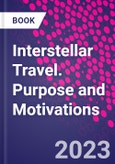Interstellar Travel: Purpose and Motivations is a comprehensive, technical look at the necessary considerations for interstellar travel addressed by leading experts in the field, from scientists studying possible destinations (exoplanets) and the vast distances between, to those concerned with building institutions and capabilities in society that could sustain such endeavors. In addition to the technical, medical, and anthropological aspects of deep space travel, the ethics and morality of spreading Earth-based life to other worlds is also examined.
In the first book of a three-book compilation, Interstellar Travel: Purpose and Motivations offers in-depth, up-to-date and realistic technical and scientific considerations in the pursuit of interstellar travel and is an integral reference for scientists, engineers, researchers and academics working on, or interested in, space development and space technologies. With a renewed interest in space exploration and development evidenced by the rise of the commercial space sector and various governments now planning to send humans back to the moon and to Mars, so also is interest in taking the next steps beyond the Solar System and to the ultimate destination - planets circling other stars.
Please Note: This is an On Demand product, delivery may take up to 11 working days after payment has been received.
Table of Contents
CHAPTER 1 Propulsion options
CHAPTER 2 Power options
CHAPTER 3 Crew health-Psychological, biological, and medical issues and the need for a systems approach
CHAPTER 4 Interstellar life support
CHAPTER 5 Timing relationships and resulting communications challenges in relativistic travel
CHAPTER 6 Prospects for human hibernation
CHAPTER 7 Ship culture and governance
CHAPTER 8 Spare parts and additive manufacturing
CHAPTER 9 Outline: Optimal crew size at both departure and arrival
CHAPTER 10 Artificial intelligence: Useful crewman, terrible master, benign leader, or the actual payload, and do we et to choose?
CHAPTER 11 Maintaining communication with Earth during an interstellar flyby mission
Appendix A Nomenclature
Appendix B Photon efficiency bounds and bandwidth
Authors
Les Johnson Physicist and NASA Technologist, NASA Science and Tech Office,George C. Marshall Space Flight Center, The Interstellar Research Group, Oak Ridge, USA.Les Johnson is a physicist and NASA technologist at the George C. Marshall Space Flight Center where he is the Principal Investigator for flight demonstration of advanced space technology systems including solar sails, power systems, and most recently, space based solar power. He was the co-investigator on the Japanese-led T-Rex space tether experiment that flew in August 2010, the Principal Investigator for the NASA ProSEDS space experiment, received NASA's Exceptional Achievement Medal three times, and holds 3 space technology patents. His book, Solar Sails, a Novel Approach to Interplanetary Travel was favorably reviewed in the journal Nature (10 April 2008). Graphene: The Superstrong, Superthin, and Superversatile Material That Will Revolutionize the World also appeared in Nature (25 January 2018) and was excerpted in American Scientist (May-June 2018). Les is a member of the International Academy of Astronautics, the British Interplanetary Society, the National Space Society, the Science Fiction and Fantasy Writers of America, and MENSA - and is the Program Chair of the Interstellar Research Group.
Kenneth Roy Formerly Founding member and Engineer, Tennessee Valley, The Interstellar Research Group, Oak Ridge, USA. Kenneth Roy is a newly retired professional engineer. His professional career involved working for various Department of Energy (DOE) contractors in the fields of Fire Protection and Nuclear Safety. As a long-time research interest, Kenneth has been working with the idea of terraforming. He invented the "Shell Worlds� concept as a way to terraform planets and large moons well outside a star's Goldilocks' zone and under stars that have a radically different spectrum from our Sun. This was published in the January 2009 Journal of the British Interplanetary Society (JBIS). Kenneth has published multiple papers on terraforming and space colonization that have appeared in leading journals and has written chapters that have appeared in several space related books. Kenneth is a founding member of the non-profit corporation Interstellar Research Group (formerly the Tennessee Valley Interstellar Workshop) and remains active in the organization.







